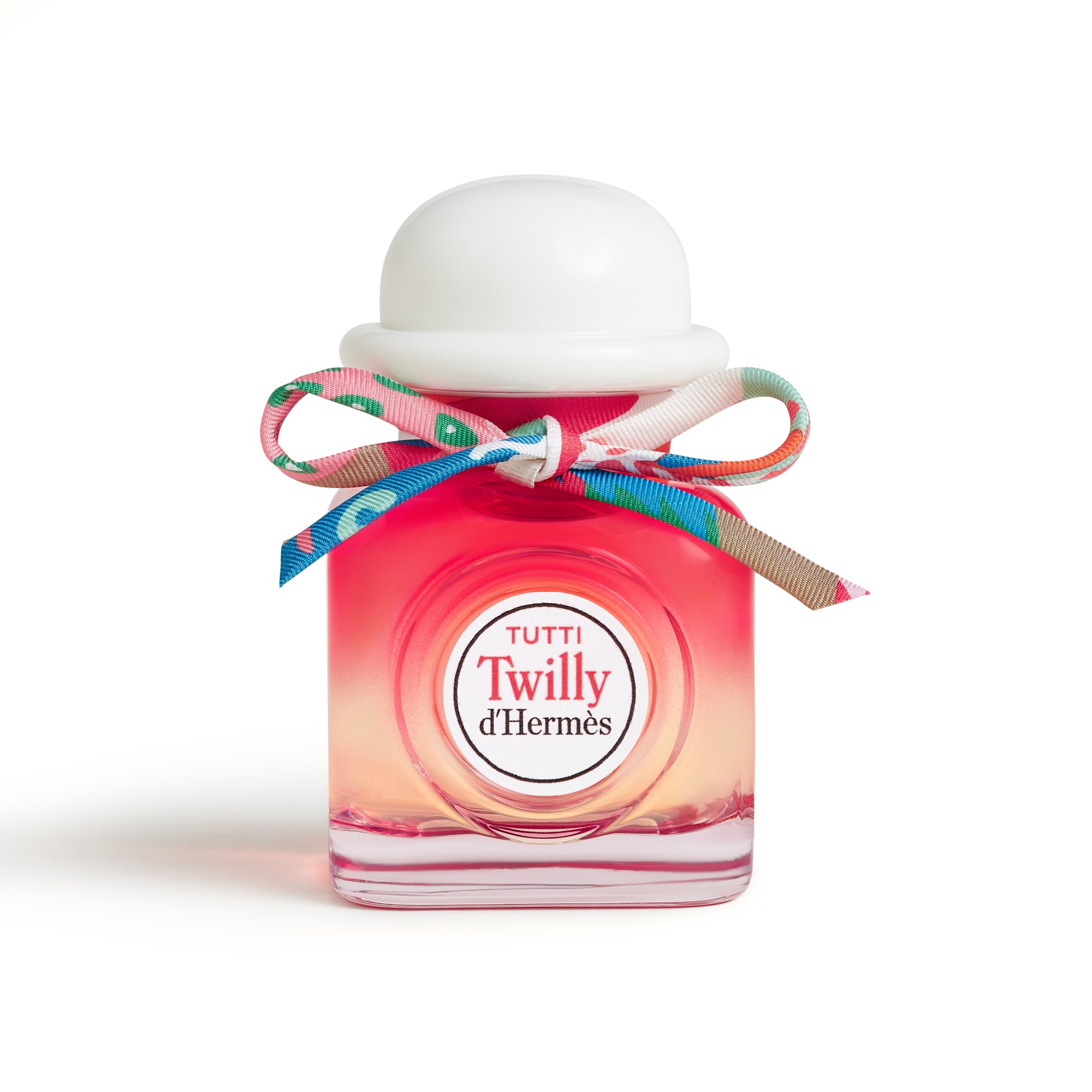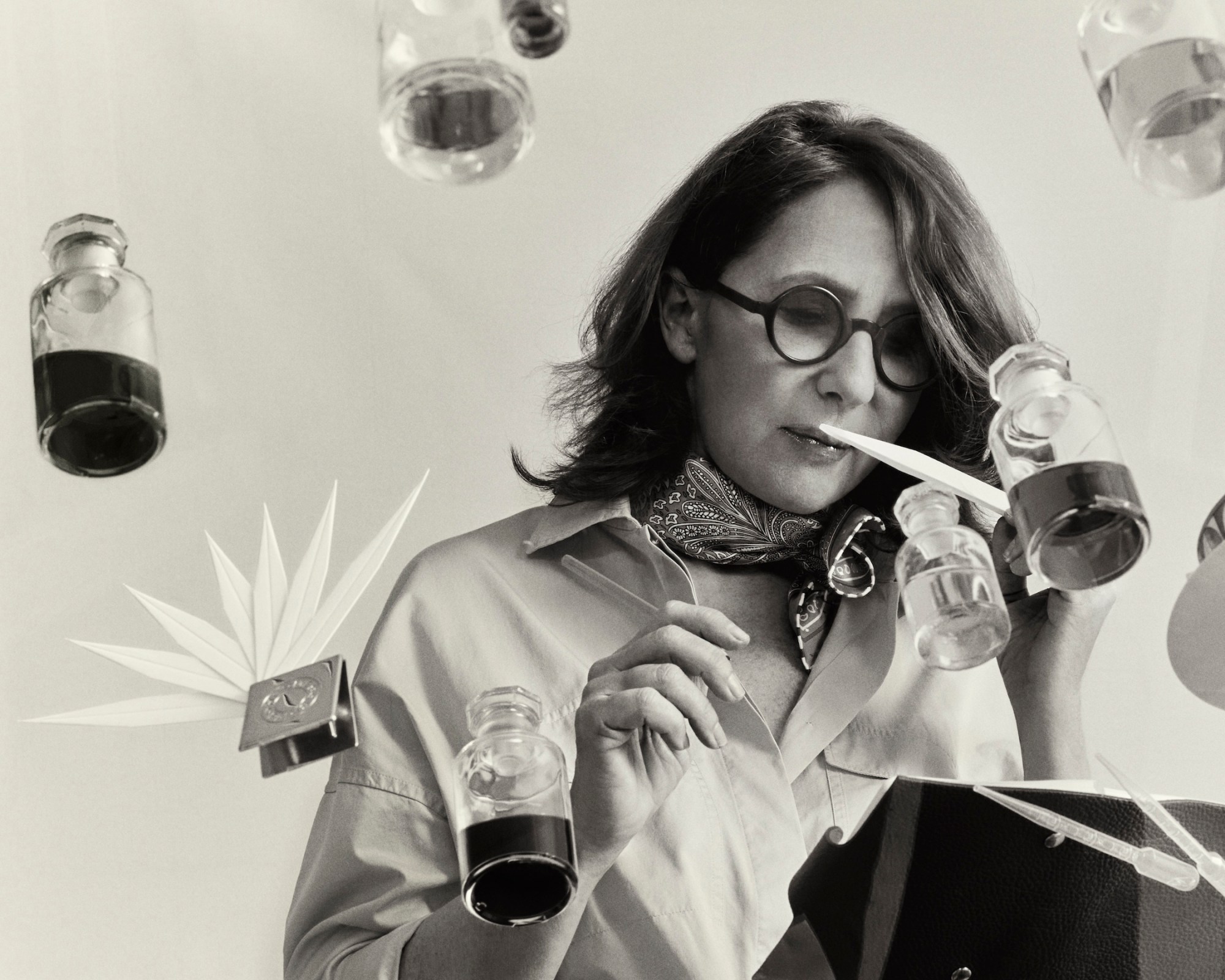You may not know her name – but you certainly know Christine Nagel’s work. She is the ‘nose’ (as they’re known in the industry) responsible for some of the world’s most distinctive fragrances. The creator behind olfactory hits like Narciso Rodriguez for Her (2003), the strawberry-and-popcorn Miss Dior Cherie (2005) and 47 fragrances for Jo Malone, since 2014, Christine has been the in-house perfumer for Hermès.
Noses are uncommon. Christine is one of only 500 or so people in the world who works at these luxury houses, identifying notes simply by smelling them, breaking down perfumes to a molecular level. By turning art into science and back again, she can conjure new formulas that we, the public, come to imbue with sentimental warmth, a psychological sense of identity and at, times, carnal attraction to complete strangers.
But how do you get there? Once upon a time, Christine was told she would never amount to a master perfumer. Instead, she started her career in the research department of Swiss fragrance firm Firmenich at a time when the profession is dominated by men – many of whom are the sons of other ‘noses’ — leading to the common misconception that becoming a perfumer is some kind of genetic rite of passage for those from Grasse, the region in the South of France where many perfumes are made. “I started to study chemistry and there was a science faculty in Geneva, just across from my laboratory,” she says. “I read about Firmenich, their incredible research laboratories. They even have a Nobel Prize winner working for them.”

Christine wrote them a letter and secured a work placement, which eventually led to a full-time job, even working alongside Alberto Morillas, one of the titans of the perfume industry. However, when she asked to transfer to the perfumery section, she was told no due to her lack of traditional background. Undeterred, Christine studied chromatography, where she examined fragrances and their ingredient recipes on a molecular level, before moving to Italy to start her own business. Within a year, she held 60 percent of Italy’s perfume contracts, including Fendi and Versace. She moved to Paris in 1997, largely because the city was “the place for perfume,” and soon started work at Quest, the company responsible for the scents for many French fashion houses. “It was marvellous because, you know, you don’t work for Karl Lagerfeld as you would for John Galliano, or Armani the same way you would work for Dolce & Gabbana. Every time I had an opportunity to work for these designers, I was learning something.”
Then, in 2014, she joined Hermès. “Perfume is often the first object that somebody can buy at Hermès,” explains Christine over the phone from her office in Paris, where she begins each day by smelling samples and formulas from the day before. “It’s true that with a perfume itself, I must concentrate all the values of Hermès: quality, excellence, the incredible raw materials, the style. It’s a big responsibility. And whether I’m working on a cologne or Hermessence or a Twilly, the values must always be present.”
Her latest fragrance, an update of her famous Twilly scent, ‘Tutti Twilly d’Hermès’, is the result of experimentation, combining ginger with lychee in an unexpected way. “With lychee, it is usually used in very tiny quantities in the perfume, maybe 0.2 or 0.3% because it’s very volatile,” she explains. “I said to myself that what I would like to do is succeed in really using lots of it, that it should be present and really be there. I didn’t want it to be in the perfume and for it to just disappear.”
Decades of training are the foundation of Christine’s practice, but it’s just as much about sensuality as it is science. “It’s important to put all of that on the side and trust your own instinct,” she says. “Today, I’m doing the real job of a perfumer with a great amount of freedom.” Here, she shares her wisdom on breaking into the career.
Subscribe to i-D NEWSFLASH. A weekly newsletter delivered to your inbox on Fridays.
The perfume industry is much bigger than you think
“There are only six perfumers in the big maisons: Dior, Chanel, Guerlain, Cartier, Hermès, and Louis Vuitton. You have many types of perfumers; those who make washing powders, shampoos, soaps, household products, cleaning products. Others make mass market perfumes. Journalists usually talk to people who make fine fragrances, but that’s a very, very small part of the perfumers who work in the perfume business.”
No day is the same as a perfumer — you have to know what works for you
“I smell better in the mornings. My nose is very precise at that time of day. I come very early in the morning, and I smell a lot of things and do a lot of tests, I have blotters that dry from the evening before. I do tests, I re-smell. And then I always smell on my skin to test. I normally have little stickers all over my arm. Then I receive suppliers who come in to present raw materials to me from all over the world: natural materials, synthetic materials, authentic materials. During the creative process, I work alone, and I love it. You really have that deep training and years and years of practise, but it’s important to put all of that on the side and trust your own instinct.”
The industry is evolving – and becoming more inclusive
“I think the profession has changed. In Paris, you’ve got two big perfume schools. In these schools, it’s now 90 per cent women. One school requires two years of chemistry minimum. In my generation there were far more male perfumers than women. I didn’t have parents in perfume making. Nothing was working in my favour, except that I was stubborn.”
People don’t want to smell the same
“In the post-Covid period, customers want perfume as a signature. The last 10 to 15 years, we have seen perfumes in the same family, and if something worked, a lot of perfumers would just follow that. Today, people understand that the sense of smell — olfaction — is very important. They want a more assertive, more signature perfume. I believe that is what is going to change perfumery. In the UK, for example, a lot of people mix and layer perfume. And that is something quite special, because it really explained the fact that people want their own signature. For a long time, that took me a little bit to get used to, but I now think that the most important thing is that the person should create an emotion. Somebody who is high-tech or grunge can both love a Degas painting because it touches them in a different way. It’s the same thing with perfume — it creates an emotion, whether you’re younger or older, man or woman.”
Inspiration comes from unlikely sources
“I love sweets and I have a sweet tooth. One day, I was watching a cooking show on TV and there was a little documentary on a pastry chef making cakes with ginger flowers. I had never heard of them! The next morning, I called all the florists in Paris to try and find a ginger flower. When they arrived in my office, I cut them and started to eat them, smell them. I said to myself, this can be the starting point for a new Twilly, so that’s how it started. Once I found the ginger flower, I was looking for a partner to mix with it. That’s when I had the idea of lychee because when you open it, it’s so juicy. At the same time, there is that side to the lychee that smells of a rose. And I said to myself, the petal side of the ginger flower is a good connection with the lychee, which reminds me of rose petals.”
It’s a physical job
“I can’t close my nose, you know? It’s always active. But there’s something wonderful with the nose; they’re the only cells that the body regenerates. You’re never old in the nose. That’s great. After six or 7 pm, if I’ve worked all day long, I still smell well, but it’s less clear, less sharp. When I’m very tired, I neutralise my nose by smelling my own smell. When you go to a perfume store, you smell a lot of perfumes and there comes a time when your nose is saturated. People talk about smelling coffee. For me, the best is to smell yourself to neutralise your nose, and it’s very interesting to do as an exercise. I like to be surprised, too, because surprise means that it can be the starting point of the creation. There are no rules. I don’t have any rules.”


